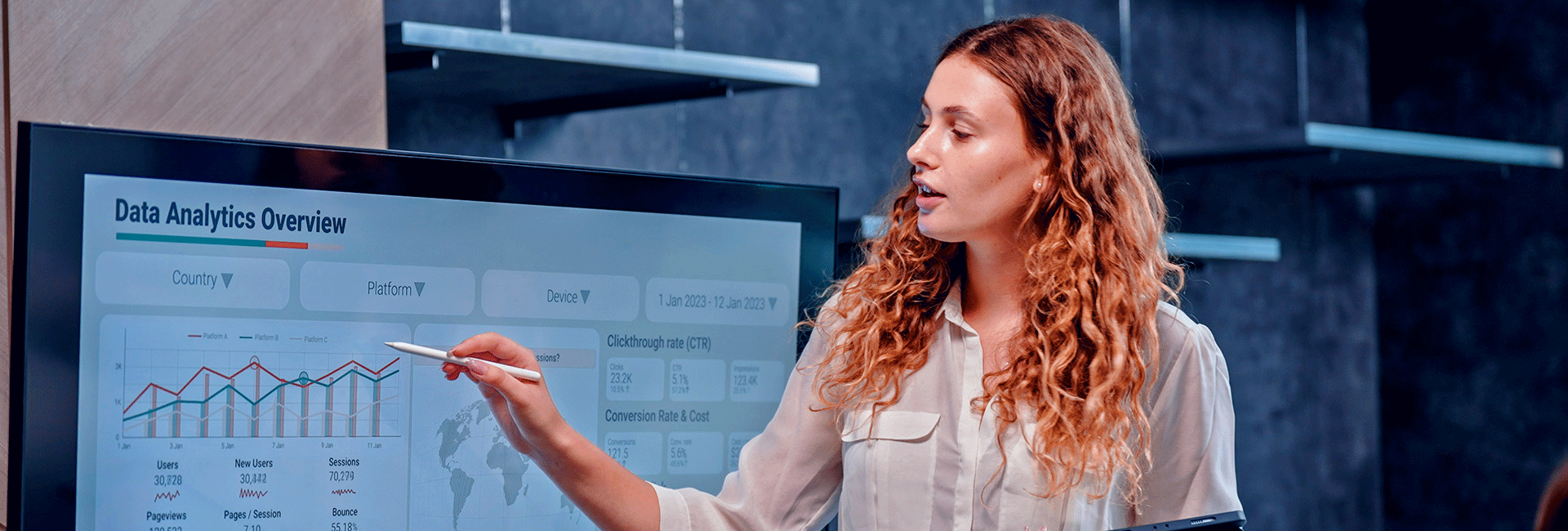
Data Science
Turn Data Into Insights that Drive Business Decisions
Our Data Science program teaches you how to find meaningful patterns in data in order to make smart business decisions. You'll learn data science skills like programming in Python and R, creating charts and graphs, and using math to solve problems. This degree prepares you for high-demand careers in technology, healthcare, finance and more. Our program combines math, computer skills and business knowledge to give you the practical experience employers are looking for in entry-level jobs in data analysis and business intelligence.
PROGRAM OBJECTIVES
Data Collection and Analysis Skills
You will learn how to gather, clean and organize large amounts of data using the right tools. You'll master basic math and statistics concepts like testing ideas and finding connections in data. These skills help you solve real problems that businesses face every day.
Programming and Coding Abilities
You will become skilled at using Python and R, the main computer languages that data scientists use. You'll write code to sort through data, create charts and build models. These programming skills are essential for any data science career.
Data Visualization and Communication
You will create clear charts, graphs and reports using tools like PowerBI, Tableau and other visualization software. You'll learn how to present your findings in ways that help others understand what the data means and make smart business decisions.
Data Science
A.S.
Locations: Lincoln / Online
Data science is the study of data to find helpful information for businesses. At SCC, you'll learn how to collect, clean and analyze data to help companies make better decisions. You'll study math, statistics and computer programming using languages like Python and R.
ESTIMATED TUITION
$7,625
CREDIT HOURS
61
PROGRAM LENGTH
4 Terms
SCHEDULE
Full-Time / Part-Time
STARTING TERM
Fall / Spring / Summer
WHY SCC?
What programming languages will I learn in this program?
You'll learn Python and R, which are the most popular programming languages used by data scientists. You'll also learn data visualization, machine learning and database management using tools that real companies use every day.
Can I transfer my credits to a four-year university?
All courses transfer to UNL as our program is an excellent fit for their Data Science program in either the College of Arts and Sciences or College of Engineering. We're also working on transfer pathways with UNO and UNK.
Do I need experience to start this data science program?
No prior experience is needed. This program works for recent high school graduates, people changing careers and working professionals who want to learn new skills. We provide hands-on training and real-world projects to build your experience.
How does this program prepare me for employment?
You'll work on collaborative projects with local businesses and organizations to gain practical experience and build professional networks. Our curriculum combines theory with hands-on practice, so you graduate job-ready with the skills employers want.
CAREER OUTCOMES
Data Scientist
Data scientists use analytical tools and techniques to extract meaningful insights from data. They collect and analyze data to solve complex Data Scientists business problems using programming languages like Python and R.
Business Intelligence Analyst
Business intelligence analysts gather and analyze company data to help businesses make smart decisions and improve their operations. They create reports and identify trends that help companies increase profits and work more efficiently.
Data Analyst
Data analysts collect, organize, and study data to find patterns and solve business problems. They use tools like Excel, SQL and data visualization software to create charts and reports for managers.